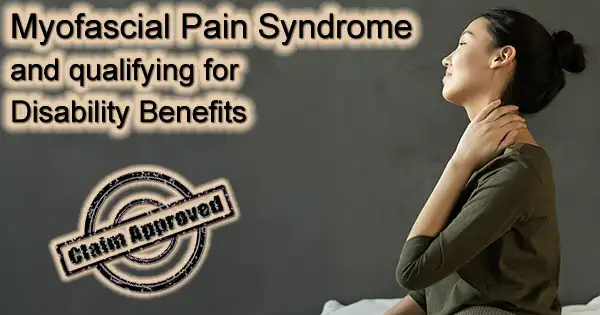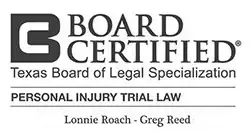Can I get Disability for Myofascial Pain Syndrome?
Can I get disability benefits if I am suffering from the effects of Myofascial pain syndrome?
Author Attorney Lloyd Bemis:
Summary: Can I get disability benefits if I am suffering from the effects of Myofascial pain syndrome?
First you must meet the SSA’s financial requirement: You must have worked long enough, recently enough, and not made over a predetermined level of income.
Second you must meet the medical requirements:
Myofascial pain syndrome is not listed as an impairment by the SSA and qualifying for disability can be tricky. In order to qualify for SSDI, an applicant must prove that they have a medically determinable impairment or MDI. This may be difficult basically because MPS is a chronic pain condition and pain is subjective; only you know how severe your pain is.
You must provide evidence of objective symptoms and your medical records should include evidence such as:
- X-rays
- Laboratory test results
- Details of trigger points that elicit pain or referred pain
- Medications, including type, dosage, effectiveness and side effects
It is very important that your doctor document your pain levels in their notes, stating how it affects your ability to perform your job and normal activities and how long your functional limitations will last.
Myofascial pain syndrome is not listed as an impairment in the Social Security Administration’s Blue Book and qualifying for SSDI can be tricky. In order to qualify for disability for MPS, an applicant must prove to the SSA that they have a medically determinable impairment or MDI. This may be difficult because MPS is a chronic pain condition and pain is subjective; only you know how severe your pain is.

While it may be disabling, myofascial pain syndrome is not listed as an impairment in Social Security’s Blue Book and qualifying for disability can be tricky. Call 512-454-4000 for help today!
Myofascial pain syndrome is one of several conditions characterized by soft tissue pain.
Approximately nine million Americans have been diagnosed with myofascial pain syndrome (MPS), also known as chronic myofascial pain (CMP). MPS is a disorder that affects the connective tissue covering the muscles (fascia) and can impact a single muscle or a group of muscles. Pressure on sensitive points in muscles, called trigger points, causes pain in a muscle and sometimes extends to other unrelated parts of the body. This is known as referred pain. An individual may not experience pain at the actual site of muscle injury or strain, but somewhere else in their body. Pain caused by myofascial pain syndrome can be linked to any part of the body including jaw pain, neck pain, headaches, arm and leg pain, and pelvic pain.
Though most people have experienced pain caused by muscle tension, the severe discomfort that characterizes myofascial pain syndrome persists and becomes worse. Other symptoms common to MPS include:
- muscle pain generated from a specific trigger point
- deep, aching pain in a muscle
- joint stiffness
- pain that worsens with activity or stress
- difficulty sleeping due to pain
- depression and fatigue
These or a combination of these symptoms can cause you to miss work and jeopardize your ability to maintain employment.
Treatment for myofascial pain syndrome usually involves a combination of medications, physical therapy and trigger point injections.
Medications can relieve pain, depression and sleep disturbances while physical therapy and massage can strengthen muscles and relieve muscle tension. Patients may also benefit from non-traditional medicine, such as acupuncture.
Demonstrating that you are following your doctor’s treatment plan is an important part of qualifying for disability benefits.
Myofascial pain syndrome can be debilitating, affecting an individual’s range of motion and mobility and causing depression and fatigue.
Medications may provide relief, but also bring about side effects that interfere with a person’s daily life, including employment. While it may be disabling, myofascial pain syndrome is not listed as an impairment in Social Security’s Blue Book and qualifying for Social Security Disability Income can be tricky. In order to qualify for SSDI, an applicant must prove to the Social Security Administration that they have a medically determinable impairment or MDI. This may be difficult basically because MPS is a chronic pain condition and pain is subjective; only you know how severe your pain is.
You must provide evidence of objective symptoms and your medical records should include:
- x-rays
- laboratory test results
- details of trigger points that elicit pain or referred pain
- location, duration, frequency and intensity of pain
- medications, including type, dosage, effectiveness and side effects
- treatments, such as acupuncture, and your response
- other methods to relieve pain, such as lying down or applying ice
SSA medical examiners do not meet with the applicants whose records they review and evaluate.
Therefore, it is very important that your doctor document your pain levels in their notes, stating how it affects your ability to perform your job and normal activities and how long your functional limitations will last. You may not be able to stand or walk for more than an hour without ignoring severe pain. You may have difficulty concentrating or remembering instructions. They should list all the things you must do throughout the day to relieve pain, like taking frequent breaks to lie down, nap, stretch or apply ice or heat. At the same time, you should be credible and not exaggerate your symptoms. If Social Security does not believe that your pain is disabling, it may reject your claim.

If your disability does not match a Social Security listing, you may still be eligible for Social Security Disability benefits if you have another medical condition; for example, arthritis or IBS.
Applicants often have more than one illness or injury that prevents them from working full time. By itself one disorder may not meet the requirements of an impairment as stated in Social Security’s Blue Book. However, if an applicant has multiple medical conditions, Social Security must consider how those health issues, combined together, limit an applicant’s ability to hold a job and perform necessary daily tasks. Social Security will also evaluate how your limitations affect your ability to work (called a medical vocational assessment), taking into account whether or not you are able to drive, your age, and level of education.
Contact a Social Security disability attorney at 512-454-4000 for a free consultation and see if you can get disability benefits while suffering from Myofascial pain syndrome. If you have been denied disability don’t give up!
If you have myofascial pain syndrome, you may be eligible for Social Security Disability Income, but getting approval may not be easy.
Your symptoms must last or be expected to last for 12 months and be severe enough to prevent you from working. Also, you must have worked long enough and recently enough to be covered under SSDI. Applying for Social Security benefits can be a long and confusing process. An experienced Social Security Disability lawyer with a thorough knowledge of Social Security’s requirements and procedures can evaluate your case and improve your chances for success.
Disability benefits are an important source of income for those who are unable to work. If you are not able to work due to accident or illness, you may be eligible for Social Security Disability or Long Term Disability benefits. If you have applied for benefits and been denied, contact the attorneys at Bemis, Roach and Reed for a free consultation. Call 512-454-4000 and get help NOW.
Alzheimer’s disease and filing for SSDI
Disability strikes all ages
Housing Rights for the Disabled – Know the Law

Your Free Initial Consultation
Call now:
At Bemis, Roach and Reed, if we can't help you, we will try to find the right attorneys for you.
We offer each of our prospective clients a free no obligation one hour phone or office consultation to see if we can help you and if you are comfortable with us. We know how difficult a time like this can be and how hard the decisions are. If we can be of assistance to you and help you find a solution to your issue we will, even if that means referring you to another attorney.
Let's get you Started:
If you could provide us with some basic information about your claim we will get right back with you with a free case evaluation and schedule your Free Consultation Today.
You can also email us at: contact@brrlaw.com
Kind Words from Our Clients
“The attorneys and staff at Bemis, Roach & Reed have provided me and my husband, Jeff, with stellar advice, care, and service. They made navigating the SSDI process easy, painless, and as timely as possible. During this difficult time in our lives it was a tremendous relief to know they were on our side and keeping us updated on next steps and timelines. We also had questions about my husband’s long term disability insurance and they helped us get those questions answered and resolved without any additional fee. I highly recommend Bemis, Roach & Reed.” – Kelli G
“I needed a lawyer for my case and had googled best lawyers. They came up first on my list and decided to give them a call. From the moment I called I knew I chose the right people. They said they would fight for me and fight they did. They knew what they were doing and kept good communication throughout the process. If you need someone that will listen, understand, and fight then these are the people. HIGHLY RECOMMEND.” – Marcel L.
“I’ve had a great experience working with Bemis, Roach & Reed for my disability case. I spent two years fighting on my own, until I was informed to look for a disability lawyer. Right away, sending in questions was a breeze, and from the moment my case was accepted, everything became a major weight off my shoulders. My newest appeal was filed for me, my medical records and case history sorted for me, and I could finally focus on my appointments and treatment with a little less worry. Everything was explained to me in a way that made sense, the process was set out in an easy to understand way. And, just like that, at the beginning of July 2023, my claim was accepted!” – Sunshinemutt






